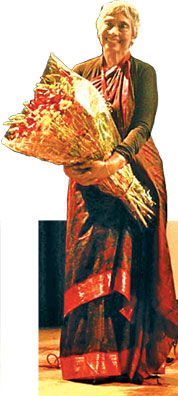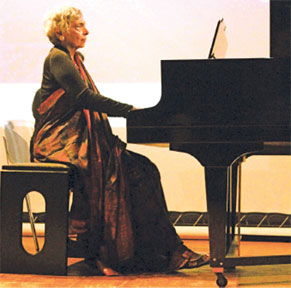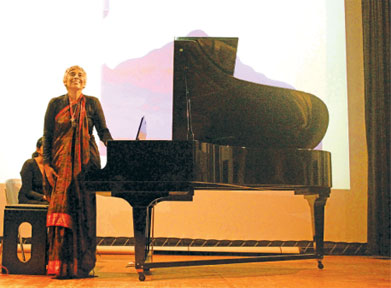|
Review
From the sublime to the mobile phone

Chamber Music Plus (II) at the Goethe
Institute.
A concert featuring Malinee Jayasinghe Peris (piano) and the projected
art of Muhanned Cader.
By Ranga CHANDRARATHNE
The second concert of the ‘Chamber Music Plus’ series presented by
the Chamber Music Society of Colombo and the Goethe Institute was held
on May 26 at the Goethe Saal in Colombo. This time around, the music was
paired with the projected abstract art of the prodigiously gifted
Muhanned Cader, but for most present, the attraction was the rare
appearance of the doyen of South Asian classical pianism, U.S. based
Malinee Jayasinghe Peris.
The concert began with three of the CMSC string principals, Cynthia
Fernando (violin), Avanti Perera (viola) and Shinichi Murata (cello)
along with its concertmaster Lakshman Joseph de Saram performing a
spirited version of G.F. Handel’s ‘The Arrival of the Queen of Sheba,’ a
witty introduction not lost on the ‘house full’ audience. Prof.
Jayasinghe Peris next joined in an absolutely passionate and revelatory
performance of Gustav Mahler’s youthful Piano Quartet in A minor.
The only complete example of his chamber music in existence, written
for piano, violin, viola and cello, the music’s visceral elements of
rage, sorrow and affection were expressed with precision and verve, the
piano at most times yielding graciously to the surging string writing.
Live music
|

Malinee Jayasinghe Peris |
After a brief verbal introduction by the Chamber Music Society’s
concertmaster on the relationship between the projected art and the live
music to be played, Malinee Jayasinghe Peris took the stage to begin her
much-anticipated solo recital.
She began with Frederic Chopin’s ‘Barcarolle’ in F-sharp minor, Op.
60. Considered the poet of the piano, Chopin’s ‘Barcarolle’ is one of
the more famous examples of the sweeping romanticism and bittersweet
poignancy that the Polish master is revered for. In this work, there
were moments when one suspected that Prof. Peris’s technique was not
quite as assured as it used to be. And then capriciously, she would
invoke something delightful with graceful ease making one realize what
an exceptional pianist she still is.
But alas, the genius of Chopin and the mastery of Ms. Peris were not
great enough to overcome the barbaric ringing and answering of a vile
mobile phone during one of the quieter moments of the piece, ruining the
music for everyone. It is a pity, for jarring annoyances are rare at the
transparently elitist Chamber Music Society soiree, the ‘Society’ and
its core audience usually smug in their seemingly cocooned irreverence
for all things common, people included.
The ‘Society’s’ upper echelons even going to the extent of publicly
boasting about how they only nurture audiences of a ‘certain’ ilk. We
are not too convinced now, since the offender came directly from the
rarified seats in the front of the hall, a not-for-sale section
permanently reserved for the ‘Society's’ guarded guest list of high
net-worth invitees. In defense of the CMSC, an announcement was made,
probably directed to the less cultured of us at the back on phone
etiquette before a single note was sounded. An exercise in futility it
turned out to be. Will we ever learn?
Next were excerpts from Claude-Achille Debussy’s ‘Images.’ ‘Poissons
D'or (Book 2 no. 3)’ and ‘Reflet dans l'eau (Book 1 no. 1).’ These were
imbued with traces of fantasy as well as obvious technique, and
Debussy’s masterful expression of multiple emotions and significances by
making use of abstract harmony and vague key signatures was brought to
the fore with consummate skill.
Crowning glories
One of the crowning glories of the piano repertoire, Maurice Ravel’s
‘Gaspard de la Nuit’ is not for the timid or the curious amateur. This
is a suite of pieces for solo piano that is almost always the exclusive
preserve of the true virtuoso, by sheer dint of it containing some of
the most demanding technique and complex musical structures ever
conceived for the instrument.
Prof. Peris’s performance of the first movement ‘Ondine’ was a class
act. The technical tour de force was radiantly accomplished with Ravel’s
essential melodic line never being compromised by over peddling and
bombast. The strenuous climax was expertly judged inspiring a rare sense
of excitement.
 The program ended with a marginally lesser known work of Franz Liszt,
‘Legende, S. 175 no. 2, “St François de Paule marchant sur les flots”
(St. Francis of Paola walking on the waves).’ The work opens with the
primary theme rendered in a subdued manner, after which it takes on a
livelier, more magnificent character. The program ended with a marginally lesser known work of Franz Liszt,
‘Legende, S. 175 no. 2, “St François de Paule marchant sur les flots”
(St. Francis of Paola walking on the waves).’ The work opens with the
primary theme rendered in a subdued manner, after which it takes on a
livelier, more magnificent character.
Growling from the left hand bass is heard to imply churning murky
waters and the agitation gradually expands, especially in the depiction
of the saint taking his first steps on the water. A tremendous octave
passage up the keyboard leads to a majestic re-statement of the
principal theme, the music thereafter portraying triumph and ultimately,
beseeching greatness. Ms. Peris was able to express all of this with an
enviable sense of élan and conviction.
Skills
Finally, it is Malinee Jayasinghe Peris’s nonchalant pianistic skills
that inspire you, as she nears her eightieth third birthday, her playing
is more subtle and investigative than ever. What an object master class
she provides for younger pianists, who may have realised on listening to
her, that their own over-anxious desire to display their goods with
shallow and pointless gestures is perhaps more detrimental than
beneficial to the overall effect the music needs to maximise its impact
on the audience. With Prof. Peris, all is outwardly achieved with an
insight and prudence that have nothing to do with expressive frugality.
In a country renowned, more for its dilettantes in the local
classical music scene, Malinee Jayasinghe Peris was one of the first to
break free from those accepted norms of self-satisfied amateurism by
taking the brave step of leaving these shores to professionalise and
internationalise the art form of the Sri Lankan solo pianist. From
studying with the legendary Louis Kentner, to playing chamber music with
Lord Yehudi Menuhin, from performing at Avery Fisher Hall at Lincoln
Center, to organising concerts for inner city children in Washington
D.C., her gift and pioneering spirit opened the doors to many present
day Sri Lankan’s that have made the art of classical music their own all
over the world. And for that, we thank her.
Quality
We also reiterate our thanks to the Chamber Music Society of Colombo
for exponentially raising the quality of the fine art of classical music
and its presentation in our country, and urge more corporate support for
their elegant value-added endeavours. The Goethe Institute too, deserves
much kudos for encouraging the growth of the arts and generously making
available their resources to the committed arts professionals of Sri
Lanka.
G.F. Handel ‘The Arrival of the Queen of Sheba’
Lakshman Joseph de Saram (Violin)
Cynthia Fernando (Violin)
Avanti Perera (Viola)
Shinichi Murata (Cello)
Gustav Mahler ‘Piano Quartet in A minor’
Malinee Jayasinghe Peris (Piano)
Lakshman Joseph de Saram (Violin)
Avanti Perera (Viola)
Shinichi Murata (Cello) |

